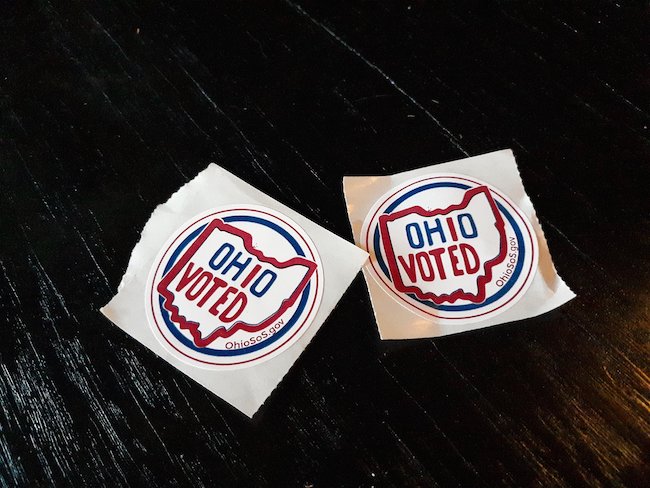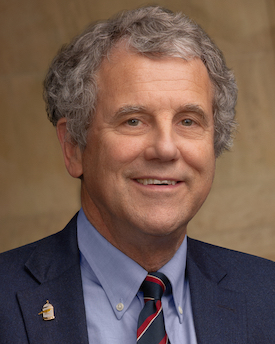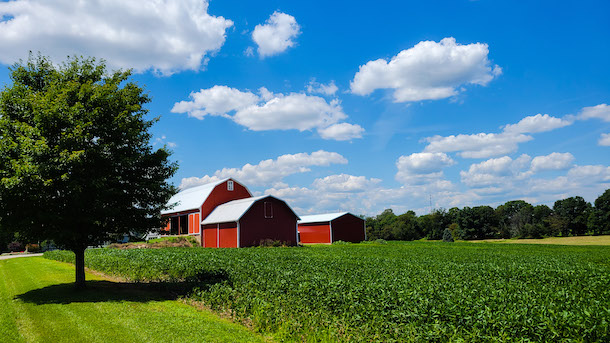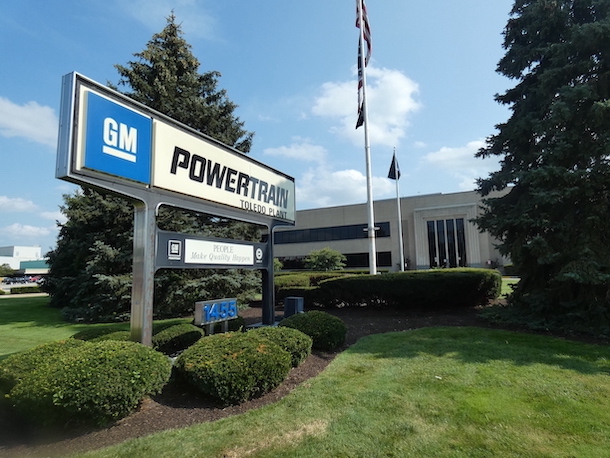Ohio Senate Race and Climate
Air Date: Week of April 5, 2024

Prior to the 2016 election of Donald Trump, Ohio had been seen as a swing state for many years. (Photo: Tim Ide, Flickr, CC BY 2.0)
The razor-thin majority Democrats hold in the Senate could be crucial to passing more climate legislation under a second term for President Biden, and in the event former President Trump is re-elected, could prevent the total unraveling of President Biden’s climate agenda. One of the key Senate races to watch in 2024 is the Ohio contest between incumbent Democratic Senator Sherrod Brown and Trump-endorsed Republican Bernie Moreno. Inside Climate News reporter Dan Gearino talks with Host Steve Curwood about the candidates and how electric vehicles and agriculture factor into the politics of this race.
Transcript
DOERING: From PRX and the Jennifer and Ted Stanley Studios at the University of Massachusetts, Boston, this is Living on Earth. I’m Jenni Doering
CURWOOD: And I’m Steve Curwood.
Voters in 2024 will not only choose who lives in the White House, but will also decide which party controls the Senate, with its unique powers to advance or block legislation and also approve or reject the appointments of judges and other high officials. Ohio is pivotal in the fight for Senate control, and after a hotly contested primary Republicans have chosen Bernie Moreno, a former car dealer who has closely aligned himself with 45th President Donald Trump. In November Mr. Moreno will face Democratic Senator Sherrod Brown. Speaking on MSNBC Senator Brown said that after already electing him three times to the Senate, Ohio voters know his record, and also know why they shouldn’t vote for his opponent.
BROWN: Well, they know that Bernie Moreno likes to look out for himself. I mean, he said in this campaign that he won't work with Democrats, he just is going to go to Washington and do his own thing. He's illustrated that by again, calling for a national abortion ban, with no exceptions, even though Ohio overwhelmingly last November, voted by 13 points for constitutional amendment on abortion rights, and the arrogance of he doesn't really care what the voters want. That's really who he is. And we will make that contrast of “I fight for Ohio. I listen to people. I do roundtables all over the state.” That's how we got a good infrastructure bill. That's how we got the chips bill. It's gonna create 1000s of jobs in Ohio. That's how you do this job.

Ohio Democrat Sherrod Brown is seeking his fourth term as United States Senator in 2024. (Photo: Rebecca Hammel, U.S. Senate Photographic Services, Wikimedia Commons, public domain)
CURWOOD: In his primary night victory speech, Mr. Moreno rejected the notion that Senator Brown knows what’s good for Ohio.
MORENO: He says he advocates for working class Americans. So, let's dissect that for a second. Under Sherrod Browns watch. China has gone from a $4 billion trade deficit to a $235 billion year trade deficit with America. The middle class in his country has shrunk under his watch. We've lost factory after factory under his watch. This is a guy who is for unfettered immigration. He is an open borders radical. What does that do? Who does that hurt? It hurts the very people he pretends to help. These are people who are getting crushed every single day at the grocery store, at the gas station. He's all for this green New Deal. This idea that all of us should drive an electric car, have whatever stove he tells us to, live in some small hut somewhere. While, of course, he hangs out with his buddies in Martha's Vineyard. That's who Sherrod Brown really is.
CURWOOD: Inside Climate News reporter Dan Gearino is based in Columbus and is following this contest. Welcome back to Living on Earth, Dan!
GEARINO: It's great to be back.
CURWOOD: So why is Ohio a significant Senate race in 2024?
GEARINO: Democrats barely control the Senate right now. And they have a pretty tough map. When you look at who is up for re-election, Joe Manchin is retiring, and Democrats are going to almost certainly lose that seat. That means that they pretty much need to run the table on almost all of their other close races. And that includes Ohio. Ohio is part of this short list--the others are Montana, Nevada, Arizona--of states where the Democratic incumbent or the Democratic candidate has to win, or else Republicans would take control. Unless there's some other race out there that becomes a competitive race that we don't think is competitive at the moment.

A house in Ohio displays an American flag and a flag in support of Donald Trump. Seen as a swing state, Ohio went to Barack Obama in the 2008 and 2012 presidential elections, and to Donald Trump in 2016 and 2020. (Photo: Elli, Flickr, public domain)
CURWOOD: So of course, Ohio has been thought of for many years as a swing state. In fact, Obama won in '08 and '12, right, but Trump won last time around, and won big. What sort of chance does Sherrod Brown have as a Democrat who knows how to win in Ohio?
GEARINO: I think that the fundamentals to pay attention to here, this has become a tougher state for Sherrod Brown to win. And with each successive election that he's had, you've seen a state that did go for Obama twice, a state that used to be almost the definition of a swing state that has the last two presidential elections gone pretty handily for Republicans and for Donald Trump. And a lot of the kind of, the Trumpiness of this Ohio electorate is that Democrats are losing white working-class voters. And there's more to it than that, but they're losing in rural areas by larger margins than used to before. And these are factors that if you're going to have a candidate who can kind of counteract that, who can work against that, Sherrod Brown is pretty close to, you know, if you were to design someone in a lab to be able to do that it would look a lot like Sherrod Brown. But the really tough part is he's on the ballot with Donald Trump. So presuming that Donald Trump wins Ohio by substantial enough margin, you would need some Trump-Brown voters for Sherrod Brown to win, and that's where it gets to be tough. But you look at polling and you look at some of the kind of prognostication about this race. It's viewed as a dead heat. So, there will be some of those Trump-Brown voters. The question is how many?
CURWOOD: Let's talk about Sherrod Brown's opponent, then, for the general election. Who is Bernie Moreno? He's the Republican candidate that Donald Trump has campaigned pretty heavily for so far.
GEARINO: So Bernie Moreno is a car dealer, a business person. And for the purposes of this race, I would say his identity is he is very much a Trump proxy. He's, if you like Donald Trump, you like Bernie Moreno. As far as like issue differences, and as far as the political track record of Bernie Moreno, he doesn't have a political track record, you know, he is someone who would be a first-time office holder, and this is the first time he's gotten a long look in a campaign like this. He did run in the primary for the US Senate seat two years ago, but he didn't stay in long enough to the point where people actually had an opportunity to vote for him. So, it's basically a pretty known quantity in Sherrod Brown against someone whose main selling point in the eyes of voters is that he was endorsed by Donald Trump.
CURWOOD: So, let's talk about the kind of record that incumbent Sherrod Brown has on the environment and other things. What's he look like? What's he sound like? What's he done?
GEARINO: Sherrod Brown is not to be confused with his neighbor to the east, Joe Manchin. So, both of these guys, they have to an extent kind of blue-collar credentials. But Sherrod Brown is much more of a down-the-line Democrat in terms of his voting record. And also, just in terms of his demeanor when handling major pieces of energy and environment legislation. You look at the Inflation Reduction Act, you look at the bipartisan infrastructure law, Sherrod Brown is someone who was a dependable supporter of those things. So, Sherrod Brown is someone who will talk about wanting an equitable energy transition. It has been important to him over the course of his career to have policies that make US manufacturing more competitive. And there's a lot of things in the Inflation Reduction Act that do that. But he is not someone who was going to put himself out there and say he's going to hold up a major piece of legislation because it doesn't do this or that for fossil fuels the way that, that Joe Manchin did.

Businessman Bernie Moreno won the Republican primary in the 2024 Ohio Senate seat race. (Photo: Gage Skidmore, Wikimedia, CC BY-SA 2.0)
CURWOOD: So, he's on the Senate Agriculture Committee, and this is a time that they're rewriting the Farm Bill. And despite the fact that most of the money for that is around food stamps, there are, of course, important environmental aspects to the Farm Bill. How is he threading that needle? There are a lot of farmers who are fairly conservative in Ohio. What kind of support can he expect from the farming community?
GEARINO: He's able to, at the very least, kind of minimize the scale of his losses in agricultural communities, in rural communities, by being pretty friendly with farming organizations, by being on the Ag Committee and by proposing legislation that will at times take an environmentally friendly approach to agriculture practices like, say, encouraging cover crops, and framing these environmentally friendly practices in terms of incentives as opposed to penalties, which of course is about the only politically palatable way that you can do some of these things trying to get farmers to modify practices. And as our politics have changed in the last couple election cycles, you see Democrats relying so much on running up the score in urban and suburban areas, and then just losing rural areas overwhelmingly. If you were kind of drawing up the plan for how Sherrod Brown holds on to the seat, it's by losing those rural areas but not getting absolutely decimated in those rural areas. And one of the reasons he can do that is that at town halls or at events, he can talk about the issues that people care about there and seem--seem credible, seem like he's not just reading talking points off of a note card. He's clearly steeped in this stuff.
CURWOOD: Dan, Ohio is pretty big when it comes to automobiles, everything from the tire making there to actual vehicle construction, some union jobs, some not union jobs. What's going on in terms of the electric vehicle transition there? And how might that end up playing in this campaign?

A farm building in Ohio. Senator Sherrod Brown is a member of the U.S. Senate Agriculture Committee. (Photo: Tom Bower, Flickr, CC BY 2.0)
GEARINO: Right now, it's an unknown how it's gonna play in the campaign. But I think that it is something I'm going to be watching out for, for a couple reasons. One is, Honda is building a gigantic battery plant in Ohio. General Motors, its joint venture that makes batteries, has a big plant in Ohio. And that's just two of a bunch of examples of how Ohio stands to benefit in a really big way from the shift to electric vehicles, in terms of adding jobs, in terms of adding investment. And in terms of the kind of partisan breakdown on this issue of the shift to electric transportation, Democrats like it a lot better than Republicans do. And it'll be interesting to see if Sherrod Brown tries to and then also interesting to see if he succeeds in saying, you know, that was legislation that Joe Biden helped to pass, that Sherrod Brown helped to pass, that is a big reason that some of these huge investments are happening. There's also this kind of anti-EV sentiment. There are those who are unionized workers who fear that EVs are bad for the long-term health of the auto worker in terms of pay and benefits, and that the shift to EVs will mean fewer workers. That's very much an open question. Whether or not that's true or not depends a lot on how well the UAW organizes battery plants. But it's something that I think Sherrod Brown could potentially argue has been a really good thing. It's also easy for opponents to just kind of stoke this anti-EV sentiment, to say EVs are new and weird and we should be scared of them. And you know, and I think that it's a sentiment that we've seen. It's a sentiment we've seen from Donald Trump, it's a sentiment we've seen from some other candidates. So, I'm curious, especially because Bernie Moreno is a car dealer. Car dealers tend to be more interested in than your average person in the new cool thing, and a bunch of automotive brands, their research and development is focusing on the electric vehicle sides of their lineups. I'm eager to see if questions about EVs come up in a debate. I'm eager to see kind of how that issue plays or if it plays very much in this campaign.

Senator Brown and Mr. Moreno diverge on the importance of electric vehicles for jobs and the environment. Above, the General Motors transmission factory Toledo Propulsion Systems (formerly known as Powertrain Toledo) recently invested $760 million in the production of drive units for electric vehicles. LG Energy Solution and Honda are currently building a plant in Jeffersonville, Ohio, that will make batteries for EVs. (Photo: MrJacon000, Wikimedia, CC BY-SA 4.0)
CURWOOD: You know, some of the record shows that Bernie Moreno is against government mandates on EVs. He's someone who speaks out for market-driven decisions, and I think it was at a rally for him that Trump went off about EVs.
GEARINO: Yes, it was at the rally just a couple weeks ago where Trump framed the effects of EVs on the auto industry as this bloodbath. And he was talking about EVs and this idea that it would be a bloodbath for the auto industry, a bloodbath for the economy, and some people heard this and thought he was talking about a literal bloodbath. I'm not really sure. But it is indicative of the way that the politics of EVs are probably going to be part of this race in some way. I don't think it's going to be a big part, but it's definitely something that we're going to see, and it'll be interesting to see how the candidates talk about it over the course of a campaign that is going to be so long, by the end of it, I swear, we're all going to just be falling over it. I joke it's gonna be like 20 eternities between now and November on this one.
CURWOOD: Dan, how much does this race matter in the context of the national elections in the presidential race, the balance of the Senate in play here, and what might happen in terms of climate and environmental policies?

Dan Gearino is a reporter for our partner Inside Climate News. (Photo: Brooke LaValley)
GEARINO: This race is incredibly important for global climate environment policy. Right now, Democrats have an incredibly thin majority in the Senate, and they're almost certainly going to lose one seat. They can't lose any of these really close races. If they lose this seat in Ohio, Republicans will most likely have control of the Senate. So if Republicans have control of the Senate, that could mean a couple different things, both of which are likely not good for climate and environment legislation. One is, if there's a Biden presidency and Republicans have control of the Senate, it will be very difficult to pass anything that would kind of expand upon what the Biden administration did with the Inflation Reduction Act and other actions. If you have a Trump presidency and Republicans, again, control the Senate and they also retained control of the House, this Republican trifecta would be able to unravel big parts of what the Biden administration just did. And the same could be said for the seat in Montana, the seat in Arizona, the seat in Nevada, and just this whole larger question of do Democrats retain control of the Senate. Any one of these seats is really important for having the ability to pass additional climate and clean energy legislation or also having the ability to stop a President Trump from unraveling some of that legislation that's already been passed.
CURWOOD: Dan Gearino is a reporter based in Columbus, Ohio for our media partner Inside Climate News. Thanks, Dan, for taking the time.
GEARINO: Thank you very much.
Links
NPR | "One of the Tightest Senate Races in the Country Will Play Out in Ohio"
New York Times | "Sherrod Brown Embarks on the Race of His Life"
Living on Earth wants to hear from you!
Living on Earth
62 Calef Highway, Suite 212
Lee, NH 03861
Telephone: 617-287-4121
E-mail: comments@loe.org
Newsletter [Click here]
Donate to Living on Earth!
Living on Earth is an independent media program and relies entirely on contributions from listeners and institutions supporting public service. Please donate now to preserve an independent environmental voice.
NewsletterLiving on Earth offers a weekly delivery of the show's rundown to your mailbox. Sign up for our newsletter today!
 Sailors For The Sea: Be the change you want to sea.
Sailors For The Sea: Be the change you want to sea.
 Creating positive outcomes for future generations.
Creating positive outcomes for future generations.
 Innovating to make the world a better, more sustainable place to live. Listen to the race to 9 billion
Innovating to make the world a better, more sustainable place to live. Listen to the race to 9 billion
 The Grantham Foundation for the Protection of the Environment: Committed to protecting and improving the health of the global environment.
The Grantham Foundation for the Protection of the Environment: Committed to protecting and improving the health of the global environment.
 Contribute to Living on Earth and receive, as our gift to you, an archival print of one of Mark Seth Lender's extraordinary wildlife photographs. Follow the link to see Mark's current collection of photographs.
Contribute to Living on Earth and receive, as our gift to you, an archival print of one of Mark Seth Lender's extraordinary wildlife photographs. Follow the link to see Mark's current collection of photographs.
 Buy a signed copy of Mark Seth Lender's book Smeagull the Seagull & support Living on Earth
Buy a signed copy of Mark Seth Lender's book Smeagull the Seagull & support Living on Earth

